family
 Miracles happen every day, whether we realize it or not. Each and every day, people’s lives are changed, people are healed, and circumstances are corrected, in ways that have no logical, scientific, medical, or financial reason. One such case occurred in 2007. A man went to the hospital because he was experiencing minor weakness in his left leg. Of course, as hospitals do, they ran a battery of tests. When they did a CT scan and an MRI, they were shocked to find that the man had an unusually tiny brain. When I say unusually tiny, I don’t mean a little smaller than normal, I mean a lot smaller than normal. Even more amazing was the fact that the man was more or less normal and functional.
Miracles happen every day, whether we realize it or not. Each and every day, people’s lives are changed, people are healed, and circumstances are corrected, in ways that have no logical, scientific, medical, or financial reason. One such case occurred in 2007. A man went to the hospital because he was experiencing minor weakness in his left leg. Of course, as hospitals do, they ran a battery of tests. When they did a CT scan and an MRI, they were shocked to find that the man had an unusually tiny brain. When I say unusually tiny, I don’t mean a little smaller than normal, I mean a lot smaller than normal. Even more amazing was the fact that the man was more or less normal and functional.
Lionel Feuillet, the neurologist handling the case, at the Mediterranean University in Marseille, France, told New Scientist that “visually, it is more than a 50% to 75% reduction.” Of course, a picture is worth a thousand words, but even the pictures are beyond belief. I don’t know how he was even alive, much less functional. The mystery immediately demanded the full attention of all the doctors and quite likely doctors worldwide. In researching the case, they found that the man had a childhood condition called hydrocephalus, commonly called water on the brain. Left untreated, the condition can be deadly. The treatment is fairly simple. A stent is placed to drain the water. This was the treatment the man had received as a boy.
Then, when he was 14 years old, the stent was removed. No specific reason for the removal was stated, but apparently, they decided that he didn’t need the stent any longer. From the situation at the time, he went into the hospital, it’s a logical assumption that his childhood condition continued to affect the man’s brain after the stent was removed, slowly filling over time. Slow enough that the brain was able to remap itself in an amazing  display of the brain’s adaptability, which enabled him to live a normal life. His IQ was reported to be 75, which is below the average of 100, but not low enough to be deemed mentally retarded or disabled. I suppose some would call that “the amazing brain” and nothing more, but the brain was created by God, and so could be fixed by God. In fact, I believe that this man’s brain could continue to improve over time. Still, he has led a good life. He is even married and has two children. For a man who is missing up to 75% of his brain, that is amazing.
display of the brain’s adaptability, which enabled him to live a normal life. His IQ was reported to be 75, which is below the average of 100, but not low enough to be deemed mentally retarded or disabled. I suppose some would call that “the amazing brain” and nothing more, but the brain was created by God, and so could be fixed by God. In fact, I believe that this man’s brain could continue to improve over time. Still, he has led a good life. He is even married and has two children. For a man who is missing up to 75% of his brain, that is amazing.
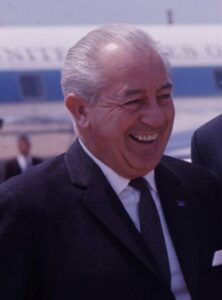
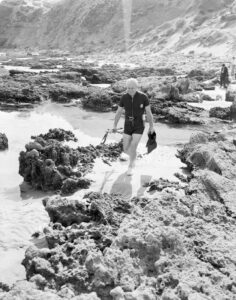 When someone goes missing, it leaves a number of people at a standstill, so to speak. At first, they think they can find the person quickly, but then, if the ordeal carries on for a while, they begin to lose hope of ever seeing their loved one again. When the missing person is someone of prominence, the case goes very public, very quickly, and while that could help find the person, it also puts a negative connotation on the situation.
When someone goes missing, it leaves a number of people at a standstill, so to speak. At first, they think they can find the person quickly, but then, if the ordeal carries on for a while, they begin to lose hope of ever seeing their loved one again. When the missing person is someone of prominence, the case goes very public, very quickly, and while that could help find the person, it also puts a negative connotation on the situation.
On December 17, 1967, in what turned out to be an unsolved missing person case, Harold Edward Holt, who was Australia’s 17th Prime Minister and a member of parliament for 32 years, disappeared during his first term in office as Prime Minister. He was never found, and the case remains unsolved to this day. That December 17th was a Sunday morning. Holt decided to drive down to Melbourne with friends and bodyguards to see British Yachtsman Alec Rose sail through port. The plan was to watch the yacht go through, and then head down to Holt’s favorite swimming and snorkeling spot at Cheviot Beach, east of Port Phillip Bay. While there, Holt decided to take a swim. Holt went down to the water, which has notoriously strong currents and rip tides. Soon after going in, Holt disappeared from view and the situation quickly escalated into one of Australia’s largest search operations ever, but the search was in vain, and Holt was never found.
Now, this might seem like a simple case of drowning, but with no body found, there is always room for speculation as to the “real” reason for his disappearance. People began to speculate that he was caught in strong currents and then dragged underwater and whisked further out to sea. That would be the most logical cause of his disappearance, but it was also speculated that he may have faked his own death to run off with his mistress. It seems strange that he would walk away from his sons too, but you never know.
Holt was born on August 5, 1908, at his parents’ home in Stanmore, New South Wales, a suburb of Sydney. He was the first of two sons born to Olive May (née Williams; formerly Pearce) and Thomas James Holt. In 1927, Holt began studying law at the University of Melbourne, while living at Queen’s College on a scholarship. He represented the university in cricket and football, and was also active in various student organizations, serving as president of the Law Students’ Society and of the Queen’s College Social Club. Holt won prizes for oratory and essay-writing and was a member of the inter-university debating team. He graduated with a Bachelor of Laws degree in 1930. Holt’s father, who was living in London, invited him to continue his studies in England, but he declined the offer. Holt served his articles of clerkship with the firm of Fink, Best, and Miller. He was admitted to the Victorian Bar in late 1932 and opened his own legal practice the following year. Unfortunately, the Depression brought with it few clients, and he was frequently underpaid. During those years, he lived in a boardinghouse and often relied upon the hospitality of friends. It was this time in his life that made him consider politics. Holt married Zara Dickins, the daughter of a Melbourne businessman, after an on 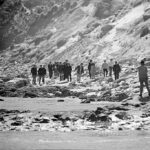
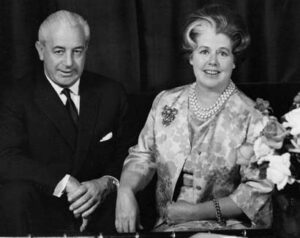 again off again, relationship, and her first marriage to James Fell, a British Indian Army officer. He later adopted her three children, and many people thought he was probably the biological father of her twins, Sam and Adrew, who look a lot like Holt. She also had an older son named Nicholas, whom Holt adopted as well. After his presumed drowning, Zara Holt said that he had been involved in a number of extramarital affairs, sparking the idea that maybe he wasn’t really dead. I doubt we will ever know. A memorial service was held on December 22nd, at St Paul’s Cathedral, Melbourne.
again off again, relationship, and her first marriage to James Fell, a British Indian Army officer. He later adopted her three children, and many people thought he was probably the biological father of her twins, Sam and Adrew, who look a lot like Holt. She also had an older son named Nicholas, whom Holt adopted as well. After his presumed drowning, Zara Holt said that he had been involved in a number of extramarital affairs, sparking the idea that maybe he wasn’t really dead. I doubt we will ever know. A memorial service was held on December 22nd, at St Paul’s Cathedral, Melbourne.
 These days, it’s strange to think of battles being fought on US soil. We have begun to believe that a war, at least can’t take place on our soil anymore, because we have so many early warning systems to tell of any incoming missiles or planes, but that wasn’t always the case. The Civil War was one of the biggest wars fought on US soil, and strangely, we were fighting ourselves. Civil Wars are among the worst kinds, because there is so much anger and unrest. We have had a number of wars fought here, including the Civil War, which was clearly one of the worst on our soil. Wars are unpredictable, and the length of battles vary, with some long and drawn out, and some were just one or two days. The Battle of Nashville, Tennessee, fell into the latter category, fought on December 15 and 16, 1864, between the Confederate Army of Tennessee under Lieutenant General John Bell Hood and the Union Army of the Cumberland under Major General George H Thomas. The Battle of Nashville was part of the Franklin-Nashville Campaign.
These days, it’s strange to think of battles being fought on US soil. We have begun to believe that a war, at least can’t take place on our soil anymore, because we have so many early warning systems to tell of any incoming missiles or planes, but that wasn’t always the case. The Civil War was one of the biggest wars fought on US soil, and strangely, we were fighting ourselves. Civil Wars are among the worst kinds, because there is so much anger and unrest. We have had a number of wars fought here, including the Civil War, which was clearly one of the worst on our soil. Wars are unpredictable, and the length of battles vary, with some long and drawn out, and some were just one or two days. The Battle of Nashville, Tennessee, fell into the latter category, fought on December 15 and 16, 1864, between the Confederate Army of Tennessee under Lieutenant General John Bell Hood and the Union Army of the Cumberland under Major General George H Thomas. The Battle of Nashville was part of the Franklin-Nashville Campaign.
As far as battles go, the length does not necessarily have anything to do with the size of the victory. The Battle of Nashville was short, but it was also one of the largest victories achieved by the Union Army during the Civil War. Hood’s army was effectively destroyed when Thomas attacked and routed it as a capable fighting force. Amazingly, the Battle of Nashville was considered the only perfectly fought battle of the war, because it unfolded in “greater accordance with the victor’s battle plan” than any other clash of the war. Nashville, at that time was the second-most fortified city in America…second only to Washington DC, making the victory there an even greater one.
Although Thomas’s forces were much stronger than Hood’s army, Hood’s army was still a force to be reconned 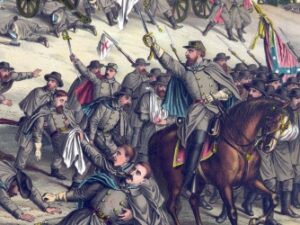 with and could not be ignored. Hood’s army had taken a severe beating at Franklin, but it nevertheless presented a threat by its mere presence and ability to maneuver. Therefore, Thomas knew he had to attack. He prepared cautiously, because he knew that Hood was not a complete pushover, and therefore, a poorly executed plan of attack could have ended in disaster. Thomas was concerned about his cavalry corps, because they were commanded by the energetic young Brigadier General James H Wilson, but they were poorly armed and mounted, and he did not want to proceed to a decisive battle without effective protection of his flanks. This was particularly important, since Wilson would be facing the horsemen of the formidable Forrest. Still, refitting the Union cavalry took time, so he had to be patient.
with and could not be ignored. Hood’s army had taken a severe beating at Franklin, but it nevertheless presented a threat by its mere presence and ability to maneuver. Therefore, Thomas knew he had to attack. He prepared cautiously, because he knew that Hood was not a complete pushover, and therefore, a poorly executed plan of attack could have ended in disaster. Thomas was concerned about his cavalry corps, because they were commanded by the energetic young Brigadier General James H Wilson, but they were poorly armed and mounted, and he did not want to proceed to a decisive battle without effective protection of his flanks. This was particularly important, since Wilson would be facing the horsemen of the formidable Forrest. Still, refitting the Union cavalry took time, so he had to be patient.
While Thomas knew what he was doing, Washington was not so patient, and in fact, they were fuming at the seeming procrastination. It was then that Sherman proposed his March to the Sea. Ulysses S Grant and Henry Halleck objected to it, because they thought that Hood would use the opportunity to invade Tennessee. In response, Sherman airily indicated that this was exactly what he wanted and that if Hood “continues to march North, all the way to Ohio, I will supply him with rations.” It sounded like a perfect plan, however, when the ever-confident Sherman disappeared into the heart of Georgia, Grant once again became concerned about an invasion of Kentucky or Ohio. Grant later said of the situation, “If I had been Hood, I would have gone to Louisville and on north until I came to Chicago.” His concern doubtless reflected Abraham Lincoln’s concern. Lincoln had little patience for slow generals and remarked of the situation, “This seems like the McClellan and Rosecrans strategy of do nothing and let the rebels raid the country.” Still, the plan to attack Nashville seems to have been the right move.
Washington continued to pressure Hood to push forward. Then on December 8, a bitter ice storm struck Nashville, stalling the plan again. While unusual for  Nashville, the sub-freezing weather continued through December 12. Hood explained that to Grant, but when Thomas had still not moved by December 13, Grant directed that Major General John A Logan proceed to Nashville and assume command if Thomas had not yet initiated operations, by the time Logan arrived. Logan made it as far as Louisville by December 15, but on that day the Battle of Nashville had finally begun. A still impatient Grant left Petersburg on December 14, to take personal command. Apparently, he didn’t trust Logan much either. Once the battle began, Grant returned to Washington…a good thing, since three commanding officers might have been a bit awkward.
Nashville, the sub-freezing weather continued through December 12. Hood explained that to Grant, but when Thomas had still not moved by December 13, Grant directed that Major General John A Logan proceed to Nashville and assume command if Thomas had not yet initiated operations, by the time Logan arrived. Logan made it as far as Louisville by December 15, but on that day the Battle of Nashville had finally begun. A still impatient Grant left Petersburg on December 14, to take personal command. Apparently, he didn’t trust Logan much either. Once the battle began, Grant returned to Washington…a good thing, since three commanding officers might have been a bit awkward.
 When people are camping, the first rule is to make sure trash and leftover food are stored in airtight containers and that trash is disposed of far away from the campsite. The problem with food and trash left out in a campground is that the wild animals like the smell of these things, and they tend to come into camp at night when everyone is asleep. Before long the food they first found is gone, and they are looking for the next big score. Of course, not every animal is really dangerous when they get around food or trash, but many are. It is necessary to be careful around wild animals.
When people are camping, the first rule is to make sure trash and leftover food are stored in airtight containers and that trash is disposed of far away from the campsite. The problem with food and trash left out in a campground is that the wild animals like the smell of these things, and they tend to come into camp at night when everyone is asleep. Before long the food they first found is gone, and they are looking for the next big score. Of course, not every animal is really dangerous when they get around food or trash, but many are. It is necessary to be careful around wild animals.
By the same token, it isn’t unusual for campers to have their favorite beverage in the camp…often beer. And yes, humans tend to sometimes overdo their drinking and end up making fools of themselves because they are intoxicated. Sometimes they even get themselves into heated situations…ie arguments. Some people have even been kicked out of campgrounds for their intoxicated behavior, but we aren’t the only species that has a taste for alcohol. Believe it or not, animals like to indulge too, it they can get a hold of it.
One family found this out the hard way, in Port Hedland, Western Australia. It was the middle of the night, when a commotion was heard outside of a tent in the middle of the night. The campers turned on their torches and found a feral pig tearing open their supply of beer. By the time the pig finished the beer and headed off to look for food, it had consumed 18 cans of beer. Beer pretty much having the same kind of effect on the pig as it can on humans, the pig began to feel like he was invincible, so he decided to take on with a cow that was minding its own business nearby. Unfortunately, the pig came off on the losing end of the battle, when another 
 group of campers nearby, saw that the pig was being chased around their vehicle by a cow” Following the pig’s “ordeal,” the sheer amount of alcohol finally took its toll, and the pig passed out underneath a tree. Later, it was said that the police were reportedly trying to track down the pig. Apparently, the pig managed to elude the police and make its way home. What were the police planning to “charge” the pig with anyway…RUI (Running Under the Influence)??
group of campers nearby, saw that the pig was being chased around their vehicle by a cow” Following the pig’s “ordeal,” the sheer amount of alcohol finally took its toll, and the pig passed out underneath a tree. Later, it was said that the police were reportedly trying to track down the pig. Apparently, the pig managed to elude the police and make its way home. What were the police planning to “charge” the pig with anyway…RUI (Running Under the Influence)??

 My great grandniece, Reece Balcerzak came into this world as an early Christmas present for her parents, Katie and Keifer Balcerzak, and even though her arrival was a scary one, the gift they were given was so precious to them. They spent that Christmas in the neonatal unit of Presbyterian Saint Luke’s Hospital in Denver, Colorado, where Reece received amazing care and grew to be the size of a full-term baby, so she could go home on January 29, 2017, and life settled down…well, as much as it can with a newborn. Since that time, Reece has shown the world just what a spunky girl she is. She is full of energy and laughter, and her smile just lights up your heart
My great grandniece, Reece Balcerzak came into this world as an early Christmas present for her parents, Katie and Keifer Balcerzak, and even though her arrival was a scary one, the gift they were given was so precious to them. They spent that Christmas in the neonatal unit of Presbyterian Saint Luke’s Hospital in Denver, Colorado, where Reece received amazing care and grew to be the size of a full-term baby, so she could go home on January 29, 2017, and life settled down…well, as much as it can with a newborn. Since that time, Reece has shown the world just what a spunky girl she is. She is full of energy and laughter, and her smile just lights up your heart  when you see it. Being born prematurely was not going to slow this little girl down one bit. She couldn’t wait to get born and she can’t wait to experience all that life has to offer.
when you see it. Being born prematurely was not going to slow this little girl down one bit. She couldn’t wait to get born and she can’t wait to experience all that life has to offer.
These days, Reece is big sister to her brother, Aysa and she loves him dearly. Aysa is almost Reece’s mini-me…at least where his smile is concerned. Reece has been a big sister for over two years now, and none of us can believe that time has flown by so fast. Reece is such a loving girl, and she truly showers her brother and everyone she cares about with much love. She is a joy to be around and fills their home with happiness. Reece also loves her cousin, Max 
 Herr, and her other cousins, which are numerous. She loves spending time with aunts, uncles, cousins, and especially grandparents.
Herr, and her other cousins, which are numerous. She loves spending time with aunts, uncles, cousins, and especially grandparents.
She is very active, very social, and she is having a great time is Kindergarten this year. This year found Reece learning to ride a horse. She had such a good time, and who knows, maybe we have an equestrienne in our family. She has also taken dance lessons, played t-ball, and she is an all-around girly girl. Reece is a girl with many talents and just as many likes and dislikes. Mostly she likes many things and many people. And everyone loves Reece. Reece is totally able to entertain anyone with her antics, especially the other kids. Today is Reece’s 6th birthday. Happy birthday Reece!! Have a great day!! We love you!!
 It’s a sad thing when someone dies with no next of kin…no friends or loved ones to see to funeral arrangements, last wishes, or even, to attend the funeral. I suppose for the most part, the unfortunate departed one would probably be cremated and no funeral would be held…at least in most places that would be the case. That seems even more sad than someone who lived their last days alone, with no friends and no family. It’s almost like being thrown away.
It’s a sad thing when someone dies with no next of kin…no friends or loved ones to see to funeral arrangements, last wishes, or even, to attend the funeral. I suppose for the most part, the unfortunate departed one would probably be cremated and no funeral would be held…at least in most places that would be the case. That seems even more sad than someone who lived their last days alone, with no friends and no family. It’s almost like being thrown away.
In Amsterdam, however, they just can’t stand the thought of such a sad end to such a sad life. So, they began a tradition. In a heart-warming tribute to those lost souls who pass without any next of kin or friends, a poet will write a poem and even recite it at the funeral. What an incredible act of kindness and compassion!! These poets are not paid for their services, and yet they take to time to write a poem specifically for the newly departed person, even though the poet never knew the departed.
poem and even recite it at the funeral. What an incredible act of kindness and compassion!! These poets are not paid for their services, and yet they take to time to write a poem specifically for the newly departed person, even though the poet never knew the departed.
Frank Starik leads a group of poets in Amsterdam. These poets attend the funerals of the city’s “unmourned” dead, remembering them with a specially composed poem. “I want to give them back a life, a history” he told Reuters reporter Alexandra Hudson. The social services in Amsterdam bury around 250 people a year, and about 15 of those depart with no trace of relatives or friends. For most of us that seems unheard of and shocking, but I suppose that these people are often buried or cremated with little fanfare, so we rarely hear anything about them, but these are the cases closely watched by the poet group, so they can step in and give their own tribute and a labor of compassion and love for a person who had no one to love them. While the poets write their poems, the city contributes by providing a coffin, bouquet of flowers, and even plays music 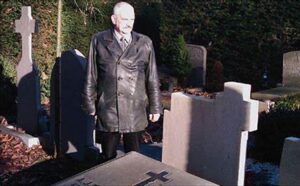 best guessed to be the deceased’s choice of music. I’m not sure how they know what music to use, but maybe they look at the things in the deceased’s home, or anything else like name the wearing of a cross. I love these acts of kindness, and what social worker told Reuters when he said, “Everyone in Amsterdam – rich or poor – should have a dignified funeral, with flowers, with coffee and some thoughts about their life. We are not responsible for how they lived, but we are responsible for them in death, and if they died in Amsterdam then they are one of us.” I can’t think of an act of kindness that is more touching than this. Well done, Amsterdam. Well done.
best guessed to be the deceased’s choice of music. I’m not sure how they know what music to use, but maybe they look at the things in the deceased’s home, or anything else like name the wearing of a cross. I love these acts of kindness, and what social worker told Reuters when he said, “Everyone in Amsterdam – rich or poor – should have a dignified funeral, with flowers, with coffee and some thoughts about their life. We are not responsible for how they lived, but we are responsible for them in death, and if they died in Amsterdam then they are one of us.” I can’t think of an act of kindness that is more touching than this. Well done, Amsterdam. Well done.
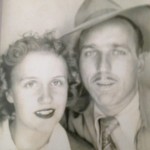
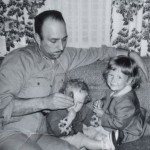 Somehow, this year, this day sneaked up on me. I knew what day my dad, Allen Spencer passed away, and I knew it was coming up, but then…suddenly, yesterday as I was working on my computer, I realized that it was tomorrow, and it hit me like a kick in the gut. I hate that. I prefer to be prepared for the coming of this day and other days like this, so I can steel my emotions to it. It seems impossible that my dad has been in Heaven for 16 years now. There are great grandchildren and great great grandchildren that he never got to meet. There are so many new additions by marriage that he did get to meet…and more than that, they didn’t get to meet him. That is sad indeed, because my dad loved playing with the little kids…hearing their laughter was his delight. He would have loved all of the new spouses too. We have been very blessed with all of them.
Somehow, this year, this day sneaked up on me. I knew what day my dad, Allen Spencer passed away, and I knew it was coming up, but then…suddenly, yesterday as I was working on my computer, I realized that it was tomorrow, and it hit me like a kick in the gut. I hate that. I prefer to be prepared for the coming of this day and other days like this, so I can steel my emotions to it. It seems impossible that my dad has been in Heaven for 16 years now. There are great grandchildren and great great grandchildren that he never got to meet. There are so many new additions by marriage that he did get to meet…and more than that, they didn’t get to meet him. That is sad indeed, because my dad loved playing with the little kids…hearing their laughter was his delight. He would have loved all of the new spouses too. We have been very blessed with all of them.
My dad and my mom, Collene Spencer gave us all such a beautiful life. They built in us a deep faith in God and a deep sense of family. They are both in Heaven now, but in our memories live the echos of those beautiful moments. Dad always loved to travel, and that started many family vacations. Sometimes, my parents were 
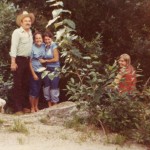 happy to plan a long vacation, and sometimes, they would just load up the car and go where the road would take us. I suppose people might think that was a weird way to travel, but those were some of the most amazing trips ever. My sisters and I can say that we have visited almost every state in the nation. We took a trip every summer…even in the lean years. I will never forget the “Wyoming Tour” when we took several legs and traveled to each of the four sections of the state. Sometimes, like that year, a tour of our home state was just what we needed, and it was very relaxing and fun.
happy to plan a long vacation, and sometimes, they would just load up the car and go where the road would take us. I suppose people might think that was a weird way to travel, but those were some of the most amazing trips ever. My sisters and I can say that we have visited almost every state in the nation. We took a trip every summer…even in the lean years. I will never forget the “Wyoming Tour” when we took several legs and traveled to each of the four sections of the state. Sometimes, like that year, a tour of our home state was just what we needed, and it was very relaxing and fun.
My dad was a gentle man, as well as a gentleman. I truly think that it was harder on him to discipline is that it was on us. Dad would do his best to try to work things out without the spanking we most likely deserved. I remember so many times that Dad kept the peace in our family. We were never allowed to “let the sun go down on our wrath.” Dad knew that it was essential to say you’re sorry and make up with your loved ones. He family struggled with that, and it caused splits in the family…with everyone but my dad. He got along with all of his 
 siblings. He refused to let it be otherwise. Dad believed in being the peacemaker. And he always was. That was probably one of the greatest and most important lessons ever. I wish my dad was still with us. I miss his teachings, his personality, his gentleness, and his kindness, not to mention his silliness, and he was able to be quite silly. I really miss that too. Today, marks 16 long years without seeing my dad. It is a kick in the gut, and I can’t wait to see him again when I go to Heaven. We love and miss you every day, Dad. Tell Mom we love and miss her too. Hugs to you both.
siblings. He refused to let it be otherwise. Dad believed in being the peacemaker. And he always was. That was probably one of the greatest and most important lessons ever. I wish my dad was still with us. I miss his teachings, his personality, his gentleness, and his kindness, not to mention his silliness, and he was able to be quite silly. I really miss that too. Today, marks 16 long years without seeing my dad. It is a kick in the gut, and I can’t wait to see him again when I go to Heaven. We love and miss you every day, Dad. Tell Mom we love and miss her too. Hugs to you both.

 My nephew, Barry Schulenberg has always been a hardworking man. Even as a young boy, all he ever wanted was to be a mechanic, just like his grandpa, my father-in-law, Walt Schulenberg. Barry was always very much like his grandpa. They were like twins…at least in their hopes and aspirations. Over the years, those hopes and dreams never changed. Of course, my father-in-law was a mechanic all along, but Barry wasn’t. He was a little boy who just wanted to quit school and go to work with his grandpa. We all thought it was such a cute thing that Barry loved his grandpa so much and wanted to be just like him.
My nephew, Barry Schulenberg has always been a hardworking man. Even as a young boy, all he ever wanted was to be a mechanic, just like his grandpa, my father-in-law, Walt Schulenberg. Barry was always very much like his grandpa. They were like twins…at least in their hopes and aspirations. Over the years, those hopes and dreams never changed. Of course, my father-in-law was a mechanic all along, but Barry wasn’t. He was a little boy who just wanted to quit school and go to work with his grandpa. We all thought it was such a cute thing that Barry loved his grandpa so much and wanted to be just like him.
Barry is grown up now, and he fulfilled that lifelong dream of being a mechanic. He has been working for the State of Wyoming for years now, and he loved his job very much. Recently, when his supervisor announced his decision to retire, Barry was offered the position of supervisor. Of course, he accepted and after some training, 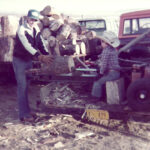
 he is now the shop supervisor. It is quite a change for Barry, but it’s one that was really the logical next step for him. I don’t know how much mechanics work he does these days, but he is at least in an advisory position for the work that is being done in the shop. It is a big responsibility, because he is responsible for making sure the highways are open and maintained…at least opened, as much as possible in Wyoming’s winters. He would also be responsible for making the decision to close, I suppose. It’s all a big change from being elbow deep in the engine of a truck, to being elbow deep in paperwork, but Barry is a smart man, and he can handle either one.
he is now the shop supervisor. It is quite a change for Barry, but it’s one that was really the logical next step for him. I don’t know how much mechanics work he does these days, but he is at least in an advisory position for the work that is being done in the shop. It is a big responsibility, because he is responsible for making sure the highways are open and maintained…at least opened, as much as possible in Wyoming’s winters. He would also be responsible for making the decision to close, I suppose. It’s all a big change from being elbow deep in the engine of a truck, to being elbow deep in paperwork, but Barry is a smart man, and he can handle either one.
When he’s not working, Barry and his wife, Kelli loved to go bicycling, hiking, skiing, and camping. They love the outdoors, and would happily spend all their free time outside, if the weather permitted. of course, most of 
 the outdoor activity they enjoy works far better in the summertime, so the warmer months are probably the ones they favor. They also love to travel and go to concerts. They have attended many over the nearly twenty years they have been married. Barry and Kellie have a sweet dog named Scout. He is their second dog together. Their first dog, Dakota died before they got Scout. Scout helped with the grieving process, and now, Scout is just their baby. They are all a happy family. Today is Barry’s birthday. Happy birthday Barry!! Have a great day!! We love you!!
the outdoor activity they enjoy works far better in the summertime, so the warmer months are probably the ones they favor. They also love to travel and go to concerts. They have attended many over the nearly twenty years they have been married. Barry and Kellie have a sweet dog named Scout. He is their second dog together. Their first dog, Dakota died before they got Scout. Scout helped with the grieving process, and now, Scout is just their baby. They are all a happy family. Today is Barry’s birthday. Happy birthday Barry!! Have a great day!! We love you!!
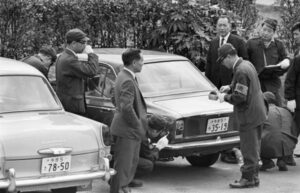 On December 10, 1968, the 300-million-yen robbery, also known as the 300-million-yen affair or incident, took place in Tokyo, Japan, when a man posing as a police officer on a motorcycle performed a “traffic stop” of some bank employees transferring money and stole about 294 million yen. This as half-century old unsolved heist remains the single largest heist in Japanese history. On that fateful day, four Kokubunji branch employees of the Nihon Shintaku Ginko (Nippon Trust Bank) were transporting 294,307,500 yen (about US$817,520 at 1968 exchange rates) in the trunk of a Nissan Cedric company car. It seems like a rather odd and very unsecure way to transfer such a large sum of money, but apparently, they saw no danger…a mistake they would most certainly regret. The money, contained in metal boxes was to be for bonuses for the employees of Toshiba’s Fuchu factory.
On December 10, 1968, the 300-million-yen robbery, also known as the 300-million-yen affair or incident, took place in Tokyo, Japan, when a man posing as a police officer on a motorcycle performed a “traffic stop” of some bank employees transferring money and stole about 294 million yen. This as half-century old unsolved heist remains the single largest heist in Japanese history. On that fateful day, four Kokubunji branch employees of the Nihon Shintaku Ginko (Nippon Trust Bank) were transporting 294,307,500 yen (about US$817,520 at 1968 exchange rates) in the trunk of a Nissan Cedric company car. It seems like a rather odd and very unsecure way to transfer such a large sum of money, but apparently, they saw no danger…a mistake they would most certainly regret. The money, contained in metal boxes was to be for bonuses for the employees of Toshiba’s Fuchu factory.
As the car proceeded along its route to the home of the bank manager for delivery to the factory, a young man in the uniform of a motorcycle police officer blocked the path of the car. Like most of us would do, when faced with an authority figure telling us to stop, the men in the car obeyed the “officer” and a mere 200 meters from its destination, on a street next to Tokyo Fuchu Prison they stopped. The impersonator informed the bank employees that their bank branch manager’s house had been destroyed by an explosion, and a warning had been received that a bomb had also been planted in the car. The four employees quickly exited the vehicle, while the police officer crawled under the car. Moments later, the “officer” he rolled out, shouting that the car was about to explode and telling the employees to run. Smoke and flames appeared underneath the car. The employees quickly retreated, and “police officer” got into it and drove away. I’m sure it took several moments for the employees to figure out that there was no bomb, and the “officer” wasn’t a selfless hero trying to get the car away from any innocent bystanders…especially when there was no explosion, and the “officer” didn’t come back. They were now faced with a new and unpleasant dilemma…telling their boss they had been duped.
The “police officer” had worked out his story well, telling the bank employees he knew about the bomb because  threatening letters had been sent to the bank manager beforehand. He was also prepared with a warning flare to create the smoke and flames he had ignited while under the car. At some point, the thief abandoned the bank’s car and transferred the metal boxes to another car, which he had stolen beforehand. Then, he also abandoned that car and transferred the boxes into to another previously stolen vehicle. He had laid out his plan very well, but there were, nevertheless, 120 pieces of evidence left at the scene of the crime, including the “police” motorcycle, which had been painted white. Unfortunately, the evidence was mostly common everyday items. It is believed that he scattered them around on purpose to confuse the police investigation…a planned which seems to have worked quite well too.
threatening letters had been sent to the bank manager beforehand. He was also prepared with a warning flare to create the smoke and flames he had ignited while under the car. At some point, the thief abandoned the bank’s car and transferred the metal boxes to another car, which he had stolen beforehand. Then, he also abandoned that car and transferred the boxes into to another previously stolen vehicle. He had laid out his plan very well, but there were, nevertheless, 120 pieces of evidence left at the scene of the crime, including the “police” motorcycle, which had been painted white. Unfortunately, the evidence was mostly common everyday items. It is believed that he scattered them around on purpose to confuse the police investigation…a planned which seems to have worked quite well too.
One suspect was the 19-year-old son of a police officer. That young man died of potassium cyanide poisoning on December 15, 1968. He had no alibi, which may not have meant anything, since the money was not found at the time of his death. His death was deemed a suicide, and he was considered not guilty, according to official record. There was simply no evidence to tie him to the crime. Another, arrest made on December 12, 1969, of a 26-year-old man, who was suspected by the Mainichi Shimbun, proved to be a dead end too, when his alibi checked out. The arrest was initially made on an unrelated charge, but on the day of the robbery, he was taking a proctored examination. The only resulting charge from that arrest was that of “abuse of power” as the arrest was made based on false pretenses.
The police launched a massive investigation, posting 780,000 composite pictures throughout Japan. Amazingly, the list of suspects (or as it really must have been, persons of interest) included 110,000 names. These had to have been people the police thought might possibly be able to carry off such a heist, because it would really be impossible to have that many real suspects. Approximately 170,000 policemen participated in the investigation, which was the largest investigation in Japanese history…or so the story goes. They gathered and examined fingerprints from the scene and comparison of them to those on file. In the end, six million fingerprints on file were compared individually, however not a single match was found.
On November 15, 1975, just before the statute of limitations for that crime was over, a friend of the 19-year-old suspect was arrested on an unrelated charge. He had a large amount of money and was suspected of the 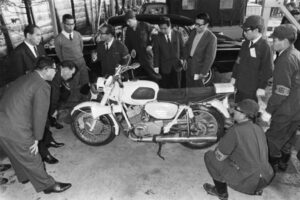 robbery. He was 18 years old when the robbery occurred. The police asked him for an explanation for the large amount of money, but he refused to speak, and they were not able to prove that his money had come from the robbery. In December 1975, after a seven-year investigation, police announced that the statute of limitations on the crime had passed, and that the investigation was at an end. In a further slap to justice, as of 1988, the thief has also been relieved of any civil liabilities, which means that he can tell his story without fear of legal repercussions. Still, no one has ever stepped forward to “tell said story” either, which tends to further exasperate the authorities, because it is the unsolved crimes that torment a police officer the most.
robbery. He was 18 years old when the robbery occurred. The police asked him for an explanation for the large amount of money, but he refused to speak, and they were not able to prove that his money had come from the robbery. In December 1975, after a seven-year investigation, police announced that the statute of limitations on the crime had passed, and that the investigation was at an end. In a further slap to justice, as of 1988, the thief has also been relieved of any civil liabilities, which means that he can tell his story without fear of legal repercussions. Still, no one has ever stepped forward to “tell said story” either, which tends to further exasperate the authorities, because it is the unsolved crimes that torment a police officer the most.

 I was born on the tip of Lake Superior, in a little town called…you guessed it, Superior in Wisconsin. While my family moved to Casper, Wyoming when I was three years old, we have been back to Superior many times, and I still consider Superior, Wisconsin my hometown. It’s like the lake and that whole area is a part of my DNA. I love our visits back there, and so many of my cousins still live there, so there will always be ties to the area. I’ve read books about the many ships that have been victim to the storms and the rocky shores in some areas, and I love to look at pictures that some awesome people post on Facebook. I know about the name that was given by the Native Americans…Gitche Gumee, which means “Big Sea” or “Huge Water” just about always refers to Lake Superior. I know about the November Gales that hit Lake Superior every November, that can easily take down an unsuspecting ship that ventured out too late in the year.
I was born on the tip of Lake Superior, in a little town called…you guessed it, Superior in Wisconsin. While my family moved to Casper, Wyoming when I was three years old, we have been back to Superior many times, and I still consider Superior, Wisconsin my hometown. It’s like the lake and that whole area is a part of my DNA. I love our visits back there, and so many of my cousins still live there, so there will always be ties to the area. I’ve read books about the many ships that have been victim to the storms and the rocky shores in some areas, and I love to look at pictures that some awesome people post on Facebook. I know about the name that was given by the Native Americans…Gitche Gumee, which means “Big Sea” or “Huge Water” just about always refers to Lake Superior. I know about the November Gales that hit Lake Superior every November, that can easily take down an unsuspecting ship that ventured out too late in the year.
Some say Lake Superior is the largest of the Great Lakes. Some say it is actually an inland sea. It is the world’s largest freshwater lake. In fact, Lake Superior is in a class by itself…and that makes it a national treasure. Its character is very unique. It looks and feels like an ocean. If you have ever seen it, your first thought is that you can’t see to the other side…like an ocean. The Lake accommodates the big ships…big ore ships, big grain haulers, the really huge ships. When you watch them come into the port, you find yourself amazed that you could be standing there beside them. Their very entrance into the port is a daily tourist attraction…and the locals love it too. Some people say that “A day on Lake Superior leaves you exhilarated, connected, restored. The Lake’s energy courses through your bones right to your soul. What a gift.” Yes, Lake Superior is most definitely a gift to be sure.
Some scientists say that Lake Superior is truly an inland sea…even if it is fresh water and not salt water. The maritime agencies take weather, navigation and buoyage very seriously, and they monitor them carefully. People are not encouraged to venture out on Lake Superior until they have met the bottom-line amount of knowledge necessary to initiate a healthy relationship with the lake. That bottom-line amount of knowledge includes paying attention to equipment, your level of training, and definitely the surrounding environment. 
 These are all important things that are recommended before a person ventures out onto any ocean or sea, which sort of classifies Lake Superior as an inland sea too. I suppose each person will have their own opinion on this, but since I have spent some time there, I tend to think that while it will always be Lake Superior to me, it will also be what I must agree, an inland sea.
These are all important things that are recommended before a person ventures out onto any ocean or sea, which sort of classifies Lake Superior as an inland sea too. I suppose each person will have their own opinion on this, but since I have spent some time there, I tend to think that while it will always be Lake Superior to me, it will also be what I must agree, an inland sea.

